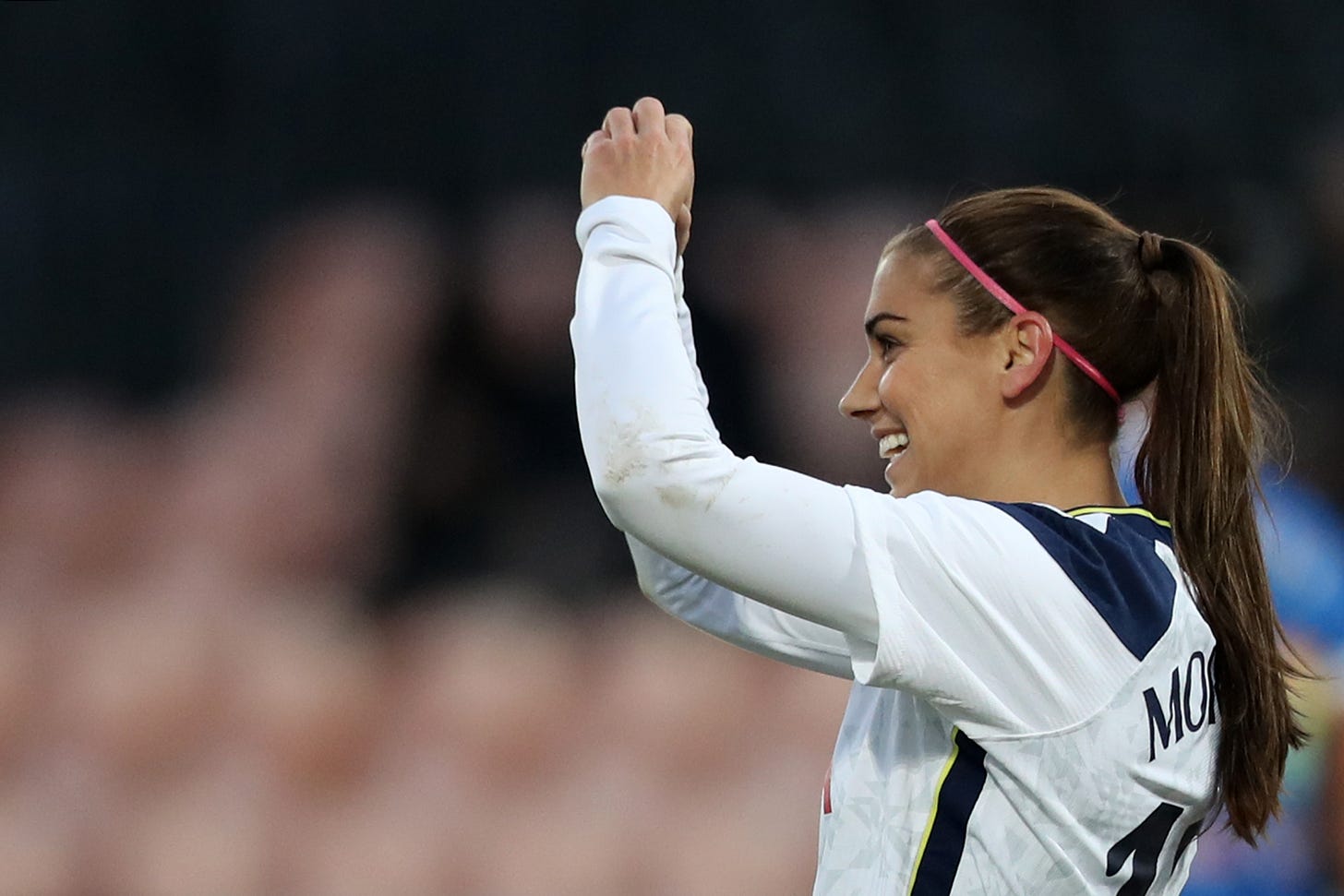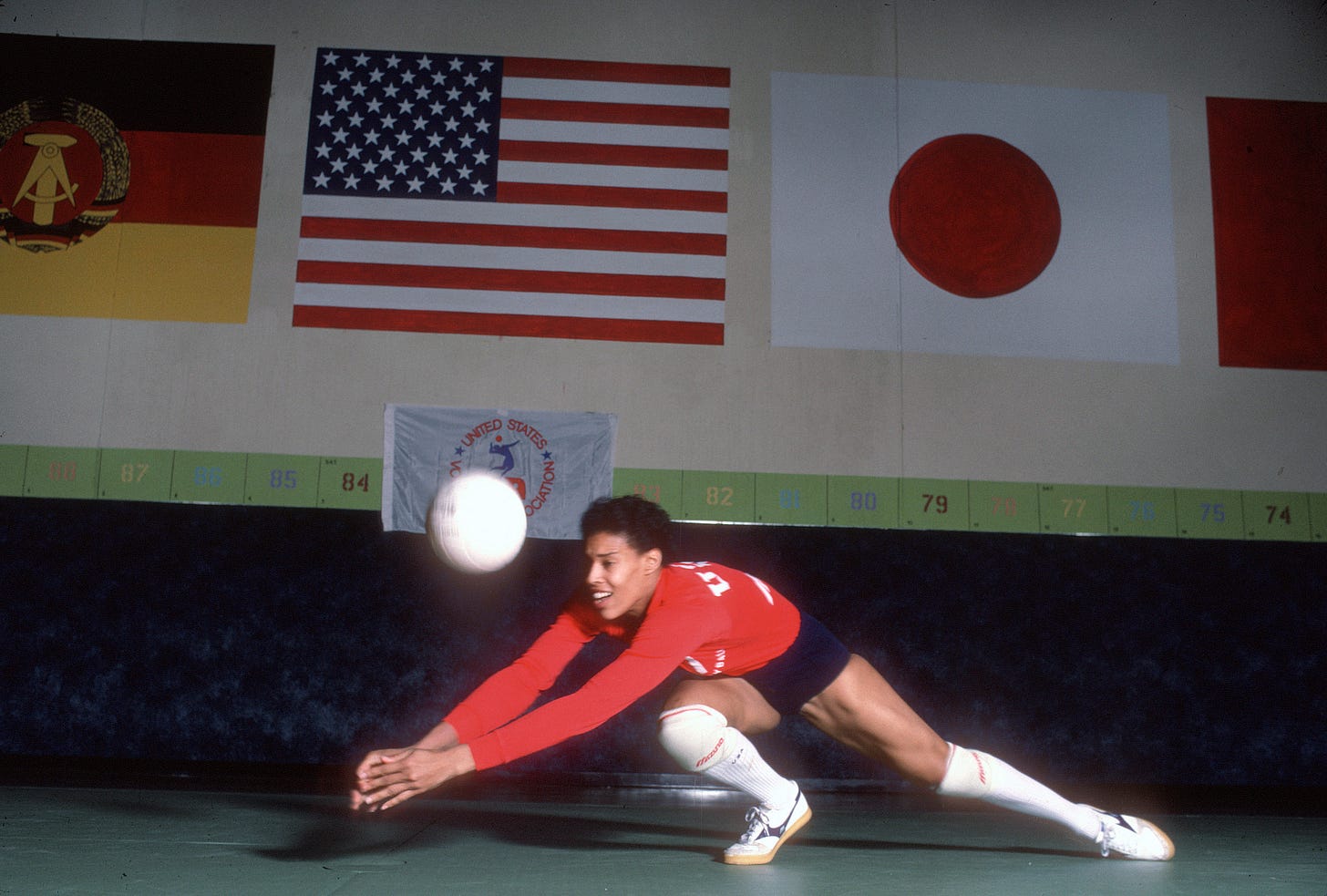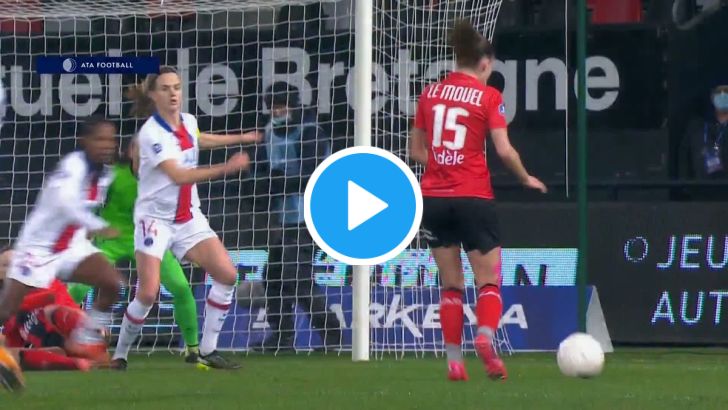How two women revolutionized the broadcast game in women's soccer
"As far as I know, this has never actually been done before.”
Hi friends, and welcome to Power Plays, a no-BS newsletter about sexism in sports, written by me, Lindsay Gibbs.
Happy National Girls and Women in Sports Day! It is the 35th annual NGWSD, and here’s something I am embarrassed I just learned: NGWSD began as a day to honor Flo Hyman, a legendary U.S. volleyball player who won a silver medal with Team USA at the 1984 Olympics and played professionally in Japan.
Hyman died from undiagnosed Marfan syndrome on January 24, 1986, after collapsing during a game in Matsue City. To learn more about her, here’s a Los Angeles Times story about her death from January 25, 1986, and a story about how her tragic death saved lives by spreading awareness about Marfan syndrome.
In honor of NGWSD, you’re actually going to get TWO newsletters from me today, which building off of Monday’s newsletter, tell two very important but disparate stories about the current state of women’s sports. We’re going to start off with the positive, a tale of two women who are truly changing the broadcast game.
Both of today’s newsletters will be free for everyone, but I’m going to be unveiling a lot of exciting subscriber-only content over the next couple of weeks. Please, if you can, consider becoming a Power Plays paid subscriber. The end of February will mark a special milestone for me — a year since I launched paid subscriptions.
To celebrate the occasion, I’m running a special for the entire month of February — you can get 21% off an annual subscription, which breaks down to less than $5/month!!
I’ll have more reflections on the challenging year that was in weeks to come, but right now I’m fully focused on making this month the biggest and best yet for Power Plays. Okay, enough rambling. Super excited to share this story. Let’s do this.
Disrupting the system
Here at Power Plays, we talk regularly about the “chicken vs. egg” debate in women’s sports — The Powers That Be don’t invest in women’s sports because they haven’t proven to be a runaway, sure-fire success; but it’s impossible to reach such levels of commercial certainty without said investment!
Far, far too often, women’s sports get trapped in this lose-lose equation.
That’s why I’m so obsessed with Atalanta Media and its Ata Football platform. Co-founders Esmeralda Negron, a former pro soccer player, and Hannah Brown, a former Sky Sports executive, saw the chicken vs. egg debate playing out in real time, and instead of just accepting the standstill, they built their own damn incubator.
The company is directly responsible for getting the Barclays FA Women's Super League (FA WSL), the top women’s soccer league in England, on NBC Sports last fall, and bringing the top French league to easily-accessible streaming platforms such as ESPN+ and DAZN. And it’s only just beginning.
“We’re very disruptive,” Negron told Power Plays. “This is non-traditional. As far as I know, this has never actually been done before.”
Step 1: Diagnosing the problem
Negron is far from a novice when it comes to the world of women’s soccer. The New Jersey native was an All-American at Princeton and a member of the U.S. U21 team with the likes of Carli Lloyd, Ali Krieger, and Megan Rapinoe. After she graduated, there wasn’t a women’s pro league in the United States, so she went abroad to play in France and Germany.
“I was the only paid player in the leagues,” Negron told Power Plays last fall. “As you can imagine this was 2005. The conditions were not great at all.”
A couple of years later, Negron came back stateside to work as an assistant coach at Seton Hall University, and considered trying out for Women’s Professional Soccer (WPS), the predecessor to the NWSL. Unfortunately, with salaries in the WPS so low, Negron decided not to chase that dream — understandably, she didn’t feel comfortable giving up a full-time job with benefits.
So it’s safe to say that Negron was very familiar with the challenges facing women’s pro soccer players on the field. But in 2018 and 2019, when she worked with Relevant Sports Group to launch and direct the Women’s International Champions Cup (ICC), a women’s professional club tournament featuring the best clubs in the world, Negron got fresh insight into the behind-the-scenes barriers in place.
“We had ESPN as our broadcast partner, but ... the coverage, the support, everything just wasn't there for the woman's ICC,” she said.
“I felt like I was climbing up this mountain with a boulder on my back being like, ‘Cover this. Market this. Promote this.’ You realize all that needs to happen in order for the women’s game to really grow. I think it was a large inspiration in terms of us launching this business.”
Step 2: Coming up with a solution
Like a true women’s sports fan, Negron frequently complained about the lack of coverage of women’s soccer to anyone in sight, which meant her coworker and roommate, Hannah Brown, became intimately familiar with the problem.
Thankfully, Brown has extensive experience in sports media — she worked at Sky Sports for nearly a decade, securing premium sports rights and leading the network’s investment in new sports ventures.
Instead of just whining like most of us do, they started strategizing solutions. They knew there had to be some way to get women’s soccer up and over the investment gap, and prove the commercial value they were confident the sport possessed. The businesswomen put their heads together and asked, “How can we change this? What can we do to accelerate growth and really make a difference on the women’s end?”
As we all know, it’s a complicated problem with many systemic layers, but Brown and Negron identified premium broadcasts as the most pressing need.

“Without (women’s soccer) being super accessible and visible, it's really hard to grow any sort of fans or audience, and that's ultimately what drives revenue in all sports,” Negron said.
“So, for us, it was like, let's try to solve this problem. Let's try to help as many leagues as we can get on premium broadcast. We'll come in, we'll invest, we'll take all the risk.”
The two decided to do something that has never been done before, and create a company that would serve as a middlewoman between the leagues and the broadcasters. That company, which would soon be named Atalanta Media, would purchase the broadcast rights directly from the leagues, and then give them to networks for free.
Confused? Trust me, I sympathize. The broadcast world is purposefully perplexing. But basically, Atalanta buys the international rights from the leagues, which gives them access to the feed produced by the leagues’ domestic broadcast team. For example, in the FA WSL, BT Sport and the BBC broadcast the games locally, so Atalanta uses their video feed and then adds its own commentators, graphics, and branding.
Atalanta then gives that production to NBC, meaning NBC doesn’t have to use any of its talent or resources to broadcast the games. This releases women’s sports from the proverbial trap.
“It's accelerating growth. It's facilitating premium visibility on premium broadcasts where it wouldn't otherwise necessarily get it this (soon),” Negron said. “You'd hope that it eventually would have happened. But we stepped in, and we said, ‘We want this to happen now.’”
Step 3: Launching the business
At this point you’re probably wondering, how in the world does Atalanta make money in this equation, and how hard was it to get this completely new broadcast model off of the ground? Let’s start with the latter: Believe it or not, Negron and Brown got this all off the ground in a matter of months.
The came up with the idea for Atalanta in December of 2019. In January, they met with NBC — which has long been the American home for the Premiere League, the men’s version of the FA WSL — to gauge their interest.
“We said, ‘Look, we're thinking about starting this business, we don't have investors yet, but if we get the rights to the FA WSL, would you air this on NBC?’” Negron recalls.
NBC immediately expressed interest. So, even though nothing was official, Negron and Brown felt confident getting a pitch together and entering a bid for the rights to the FA WSL, and the rest is (recent) history!

Since currently Atalanta is giving the broadcasts to the networks for free, they make money by negotiating ad sales splits with the networks, and by retaining full sponsorship rights. This way, they can integrate content from their partners during the broadcast, and recruit sponsors for certain segments during the game — such as awards, halftime shows, or replays.
Of course, they also had to raise money to get things off the ground. Thankfully, that was a seamless process for them, too. In February of 2020, Brown and Negron were connected to the private equity group 777 Partners in Miami. It turns out, they were looking to build up their sport and entertainment vertical, and were already interested in investing in women’s soccer and jumped on board very quickly.
“I don't know why, but Hannah and I have gone through this very confidently, without any sort of worry of ‘what ifs’ or whatnot. We just went through it and were like, ‘We're gonna do this. We're gonna find a way. We want to do this.’ We were so passionate and determined, and it didn't feel like we were facing all these obstacles and challenges. We’d go to one place, and they’d open their door to us, and be so welcoming and excited. And then we’d go on to the next and the next and the next. It never felt like we had to fight anybody on any of this,” Negron said.
“I will say I think people in general want to support visibility for women's sport and want to support and make a difference. I think sometimes it's not knowing which way to go, where to go, where to even start.”
Step 4: Surviving a pandemic
It was surprising to hear Negron say she didn’t feel the company has faced a lot of “obstacles and challenges,” because, I mean, they launched Atalanta right at the start of a global pandemic that turned the sports world upside down.
But, perhaps because the company is so nascent, Atalanta has been able to make the best of the unfortunate scenario.
“As we were going through the pandemic, people were so wanting live sports that they could watch on TV, even if it was behind closed doors. Lucky for us, we were investing in the media rights, not necessarily a live match experience in a stadium,” Negron said. “I think it actually helped us in a lot of ways. People were just excited for live sports to come on again.”
The pandemic also created a unique opportunity for Atalanta to be part of an unprecedented wave of television exposure for women’s club soccer in the United States.
Before Atalanta and the FA WSL officially launched in September, the NWSL became the first pro league in the country to return to play during the pandemic. The league struck a television deal with CBS, and while most of the tournament was aired on CBS’s streaming service, the two matches broadcast on the main CBS channel smashed previous NWSL viewership records — the opening match on June 27 drew U.S. audience of 572,000 viewers, and the championship game on July 26 drew 653,000 viewers.
Negron didn’t see this as competition; in fact, it actually served as proof of concept.
“CBS did a great job with NWSL, and it proved that when it's out there, when it's visible, when it's easy to access on premium broadcasts in front of a lot of people, people will tune in. They're interested,” she said. “Everybody benefits from more popularity and excitement and interest in soccer.”
Then, after the Challenge Cup ended, Atalanta got another boost when many of the NWSL’s biggest stars decided to go England to play in the FA WSL, in part because the pandemic was so out of control domestically and the rest of the NWSL’s 2020 plans were uncertain. Suddenly, Atalanta was getting to broadcast games not just packed with international stars, but with familiar faces that played key roles in the USWNT’s World Cup victory in 2019, such as Tobin Heath, Christen Press, Rose Lavelle, and Sam Mewis.
“That was really exciting,” Negron said. “And it's made our quest to get some more visibility for the women's game and for our leagues a little bit easier, right? People are excited to see Christen Press and Tobin Heath and play with Manchester United.”

Step 5: Conquering the world
Going forward, Atalanta is looking to get the rights to more women’s soccer leagues so they can bring more elite women’s pro soccer to the premium broadcast world. It is also growing partnerships with established names in women’s soccer coverage, such as Power Plays favorite The Equalizer, and starting to team up directly with athletes — just today, it announced that USWNT and North Carolina Courage star Jessica McDonald is the company’s first pro athlete ambassador.
Negron and Brown are also focused on building out their own digital platform at Atafootball.com.
“We eventually want it to be a global platform where players can go on, access free live and on demand matches, highlights, clips, and podcasts. Ultimately, there will be a premium subscription model based largely around player development content,” Negron said.
“Aside from that, our real focus is going to be building our community and our platform, and really figuring out ways to deliver some amazing value and experiences for these young players and fans in the U.S. and around the world. It'll probably be a pretty big lift, but we're very excited.”
Thanks so much for reading Power Plays. Remember, if you’re still just a free subscriber, now is the time to change that! Take advantage of this anniversary special now, before you forget.
Also, help spread the word of Power Plays by clicking the button below and sharing with your friends.
You all are the best.








